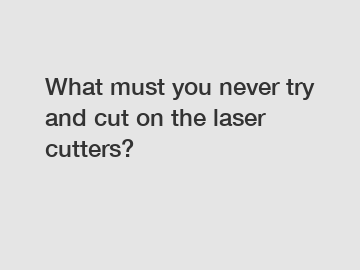What must you never try and cut on the laser cutters?
Laser cutters have revolutionized the way we create intricate designs and precise cuts on various materials. From acrylic to wood to leather, these machines can handle a wide range of materials with ease. However, there are certain materials that you should never attempt to cut on a laser cutter, as they pose serious risks to your health and safety.
One material that should never be cut on a laser cutter is PVC or vinyl. When these materials are cut with a laser, they release toxic fumes that can be harmful to both the operator and the machine. PVC contains chlorine, which can form hydrochloric acid when exposed to high temperatures. This acid can corrode the internal components of the laser cutter and pose serious health risks to those working with it. Additionally, vinyl can release chlorine gas when cut with a laser, which is highly toxic and can cause respiratory issues and other health problems.
Another material to avoid cutting on a laser cutter is polycarbonate. This material is commonly used in the construction of safety goggles and face shields due to its impact resistance and durability. However, when cut with a laser, polycarbonate releases harmful fumes that can cause eye and respiratory irritation. In addition, the laser's high heat can cause the polycarbonate to melt and create a sticky residue that can damage the machine's optics and other components.

Similarly, cutting materials that contain chlorine, such as fiberglass or carbon fiber, should be avoided on a laser cutter. These materials can release toxic fumes when cut with a laser, posing health risks to operators and damaging the machine's internal components. Additionally, the high heat generated by the laser can cause these materials to release harmful particulates that can contaminate the workspace and pose a hazard to those working in the area.
When it comes to cutting plastics on a laser cutter, it is important to choose the right type of material. While some plastics, such as acrylic and nylon, can be safely cut with a laser, others, like polyethylene and polypropylene, should be avoided. These materials can release harmful gases when cut with a laser, posing health risks to operators and damaging the machine's internal components. Additionally, the high heat generated by the laser can cause these materials to melt and create a sticky residue that can damage the machine's optics and other components.
In addition to avoiding certain materials, it is important to follow proper safety protocols when operating a laser cutter. Always wear appropriate personal protective equipment, such as safety goggles and gloves, when working with a laser cutter. Make sure the workspace is well-ventilated to prevent the accumulation of harmful fumes and particulates. And never leave a laser cutter unattended while it is in operation, as this can pose a serious fire hazard.
By following these guidelines and being mindful of the materials you are cutting, you can ensure the safe and efficient operation of your laser cutter. Remember, safety should always be your top priority when working with these powerful machines. Never compromise on safety in an attempt to cut a certain material on a laser cutter – always err on the side of caution to protect yourself and those around you. With proper precautions and a keen eye for safety, you can create stunning designs and precise cuts on a wide range of materials with your laser cutter.
If you want to learn more, please visit our website single table laser cutting machine, Large-format Laser Cutting Machine supplier, 40000W Sheet Metal Laser Cutting Machine.
221
0
0

Comments
All Comments (0)